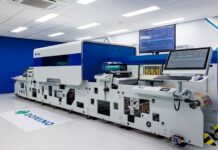Sustainable packaging leader DS Smith announced its ambitious commitment to align its global operations to a 1.5°C scenario as set out in the Paris Climate Agreement. The roadmap to 1.5°C has been submitted for verification by the Science Based Targets initiative (SBTi)*.
DS Smith North America will participate in the acceleration of the reduction of carbon emissions for its operations, as well as those of its partners and suppliers, by committing to reducing its Scope 1, 2 and 3 Green House Gas (GHG) emissions by 46% on an absolute basis by 2030, compared to 2019 levels. These targets will keep DS Smith, which is a member of the UN’s Race to Zero initiative, in line with its prior commitment to reach Net Zero** carbon emissions by 2050.
“Today’s announcement demonstrates our ambition in reducing carbon as part of our long-term sustainability focus,” said Miles Roberts, Group Chief Executive at DS Smith. “This commitment not only ensures our business is leading the way in reducing our carbon footprint, but also guarantees we are challenging our suppliers and partners to do the same.”
“Our business has ambitious growth plans over the coming years as we lead the transition to a circular economy and these commitments are a crucial part of our Now and Next sustainability strategy which will see us create a positive impact for people and the planet both now and in the future,” said Roberts.
Investing in the future
To deliver on this commitment, DS Smith will invest consistently over the next 28 years in its own operations. Investment will be made into the adoption of next generation engineering solutions, such as biomethane boiler technology. The company will also harness self-generated renewable energy sources, such as wind and solar, and power purchasing agreements to replace grid electricity.
Working with our partners
“Now more than ever before, it is critical for businesses to demonstrate their commitments to the fight against climate change,” said Keith Ledbetter, Managing Director of DS Smith North America. “DS Smith is uniquely positioned to provide integrated circular economy solutions to its customers and today’s announcement will enable us to do that with even more impact.”
DS Smith will also engage with all its strategic suppliers to encourage them to adopt science-based targets by 2027. This follows feedback from stakeholders, who are seeking to work with like-minded businesses committed to Science Based Targets and Net Zero, alongside a commitment to the circular economy. As part of this approach, DS Smith will work closely with partners, suppliers, customers and policymakers to collectively tackle climate change through the circular economy in line with DS Smith’s ambitious goals.
Committing to Net Zero
Supporting the delivery of these commitments is an ambitious Net Zero transition plan which will set out the key strategic actions and milestones that will define DS Smith’s transition to Net Zero. The plan, which will be published this summer, is aligned with the Group’s growth strategy and outlines the initiatives that will be undertaken, prioritizing the greatest sources of GHG emissions***.
“The Foundation’s report, Completing the Picture: How the Circular Economy Tackles Climate Change, shows that although the renewable energy transition is vital to tackling climate change, almost half of global GHG emissions come from the way we make and use products and food,” said Andrew Morlet, CEO of the Ellen MacArthur Foundation. “We need a circular economy — one designed to eliminate waste, circulate products and materials, and regenerate nature, to tackle those emissions and achieve the targets set out in the Paris Agreement. Today’s announcement shows that our Strategic Partner, DS Smith, is committed to ambitious action on both renewables and the circular economy.”
*The Science Based Targets initiative engages and supports companies in defining how much and how quickly they need to reduce their greenhouse gas emissions.
**The term Net Zero refers to the balance between the amount of greenhouse gas produced and taken out of the atmosphere.
*** DS Smith’s Net Zero transition plan considers future carbon costs, technology and commodity availability and cost projections. It will be periodically updated, supported by robust governance processes and regularly communicated to stakeholders.
Background on DS Smith’s carbon reduction journey to date:
- DS Smith achieved of a 23% reduction in CO2e per tonne of production between 2015 and 2020.
- In June 2021, DS Smith announced a commitment to a science-based target for 2030 and to reach Net Zero emissions by 2050, as well as becoming a member of the UN’s Race to Zero.
- In December 2021, DS Smith also announced improvement across every single one of its priority ESG ratings in 2021, including CDP Climate Change ‘A-’ rating.
About DS Smith:
DS Smith is a leading provider of sustainable fiber-based packaging worldwide, which is supported by recycling and papermaking operations. It plays a central role in the value chain across sectors including e-commerce, fast moving consumer goods and industrials. Through its purpose of ‘Redefining Packaging for a Changing World’ and its Now and Next sustainability strategy, DS Smith is committed to leading the transition to the circular economy, while delivering more circular solutions for its customers and wider society – replacing problem plastics, taking carbon out of supply chains and providing innovative recycling solutions. Its bespoke box-to-box in 14 days model, design capabilities and innovation strategy sits at the heart of this response. Headquartered in London and a member of the FTSE 100, DS Smith operates in 34 countries employing around 30,000 people and is a Strategic Partner of the Ellen MacArthur Foundation. Its history can be traced back to the box-making businesses started in the 1940s by the Smith family.




























